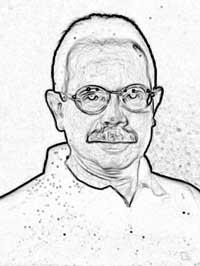Winner of the Avelino Corma Iberdrola Prize
Elhuyar: Why to chemistry?
Avelino Corma: I have always liked the sciences, the humanities too, but as the sciences attracted me more, I entered the Faculty of Sciences. I liked… physics was what I liked most, but I thought that if you take physics I could have less outputs. Of course, I was also attracted to chemistry; otherwise, I wouldn't. And that was the reason why I approached the world of chemistry, although at ease I was more physical.
Elh. : Have you written some books, lots of works in the most prestigious chemical magazines… give much importance to informative work?
A. A. C. C. Most of the articles I have written so far, not to say all, have been technical, not divulgative. All of them have been very concrete articles, with technical explanations about some work done. Now yes, I have been asked to write a few for dissemination and I intend to try to write them.
Elh. : Throughout your life you have also won many awards. Azkena Iberdrola Prize for Science and Technology 1998. What does this last prize mean for you?
A. A. C. C. I think, above all, it would be the recognition or recognition of a work done so far, which has some involvement and influence in the field that is mine. In addition, we must highlight the large size of the people who formed the jury, who have seen that my work is not just an amount account, but more.

Elh. : You work in the field of heterogeneous catalysis. What is that?
A. A. C. C. It is about designing and preparing solid materials with the capacity to fully accelerate the speed of chemical reactions, not only increasing speed, but also heading towards the product or products we want to achieve. When a chemical reaction occurs, in addition to the product that is often sought, others are generated. Often we do not want to get these products, so we call them by-products. When these products are generated we are losing efficiency, we are losing the raw material and using the natural resources that we have clumsily.
In our case, the objective is to maximize the product we want to achieve, so that the catalysis presents the least amount of by-products that can be produced in this chemical reaction.
Elh. : Therefore, there would be no waste left, no processes left.
A. A. C. C. Do not abuse the word residue, since it is immediately associated with environmental problems and vision is not that; the goal would be to get a product you want, reduce the presence of other by-products that may arise. If the catalyst is correct and good, the product sought will be obtained at 100%, without generating anything else.
Elh. : And all this in what does it apply?
A. A. C. C. In a simple and understandable way, for people to make an idea of 80% of all the chemical processes underway in the world. In the pharmaceutical industry, in the plastics and polymer industry, in the area of fuels and refineries, catalysts are used in the generation of food additives, flavors, mines, etc., which means that 80% of all processes that are carried out in the industrial world use the catalyst at some point.
Elh. : You also work in fine chemistry.
A. A. C. C. Well, fine chemistry would be very similar, but taking it to the extreme would be to get products with high added value in not very large quantities, such as medicines or perfumes. In any chemical process, for example, the one that wants to get gasoline in the process of obtaining gasoline, wants to get it, and not gases or fuel. Therefore, the process should focus on it, and not on anything else, whether you want to get a polymer fiber or not anything else, it as clean as possible, without contamination.
Elh. : They say you have to focus the process towards what you want. But, how does it get?
A. A. C. C. Each type of catalyst directs the chemical reactions in a special way. This is done by zeolites, that is, by molecular filters. If you manage to control the hole of this molecular network during the reaction, you can choose which molecules pass through the zeolites and which do not. Therefore, in this way, the reaction towards obtaining a product or another is channelled.
Elh. : Returning to more general topics, for the year 2000 in Granada will be held a seminar on catalysis. Why?
A. A. C. C. This type of congress is held every four years, and it can be said that they are the Olympics of catalysis. The scientists who are working in the field of catalysis will meet and the advances that have occurred will be presented. It is a congress of great prestige, in which all want to present their works, but the desire to present them is not usually enough. Based on scientific criteria, a preselection is carried out and it is decided which works are presented and which are not.
Elh. : And what role do you play in that congress?
A. A. C. C. As chairman of the scientific committee, along with other national and foreign experts, my duties would be to select the papers to be exhibited at the congress and to participate in the scientific sessions.
Elh. : We have talked about the presentation of the advances, but in the Olympics we also talk about the competition, can you talk about it in a congress of these characteristics?

A. A. C. C. Of course, in the scientific world there is always competition. The one looking for something new will always try to find him and not another, if another comes out first, has finished the job. Competition occurs when the need arises to be one the first to achieve a specific objective, competition that in the industrial world is even more fervent, because the first, the one that takes the patent, gets the exclusivity.
Elh. : Advances are presented every four years. However, the research work is continuous. How do you see the situation of the world of research?
A. A. C. C. As for the field of research in Spain, it is evident that in the last 10 years an important and special effort has been made by the Administration. As a result, in Spain there are currently highly competitive teams at the international level and well positioned.
However, it seems that lately the thrust is not so big, it is shrinking and losing a little. This situation doesn't make much sense, because research doesn't admit cuts, you always have to help. Advancing with sporadic impulses, besides being insufficient, is practically impossible.
Elh. When it comes to talking about the world of research or investigators, often they are known in the investigative media that move abroad, no news of the State is mentioned. Why?
A. A. C. C. To begin with, I would mention the clichés used in the media; one, like now everything is environment, another is the brains that have gone and go abroad. It is true that there are many Spaniards abroad, but it is also true that there are a large number of people around the world outside their country: Hungarians, French, English, etc.
In that sense, science is very international, it has that character. In addition, as is normal, any country wants to have the best people possible; in football it does so and I think it would have to do more in science, but since this country is not scientific power, we have lost people and opportunities.
Elh. : The money received in the Iberdrola Prize must also be allocated to it.
A. A. C. C. The 12 million prize will not be kept for me. In the case that the administration and some companies support me, I intend to create a foundation from that money, in order to grant scholarships to people who work in the field of catalysis.
Buletina
Bidali zure helbide elektronikoa eta jaso asteroko buletina zure sarrera-ontzian











